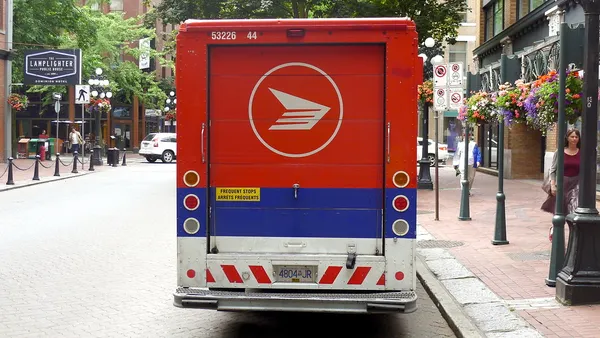Dive Brief:
- Shippers can expect stable to increased rates across full- and less-than-truckload shipments in 2020, according to Transplace's Logistics Market Quarterly Update and Outlook Report for Q4 2019.
- Transplace predicts a seasonal uptick in spot rates will increase dry van prices 2% to 3% in the latter half of 2020, keeping pace with inflation. Refrigerated loads are expected to grow by 2.9% with commensurate rate increases.
- Transplace expects contract rates to increase by 2.5% to 5.5% in the first half of 2020 for LTL, which has been more heavily impacted by the year-over-year (YoY) decline in the U.S. manufacturing sector, experiencing its fourth consecutive YoY decline in tonnage in Q4 2019. Average shipment weight is declining, the report found, "due to the softening of the TL market and general economic conditions and less product being ordered at a time."
Dive Insight:
Recession concerns cropped up across the trucking sector last year as a significant number of firms closed their doors. Class 8 orders were "significantly down trending throughout 2019 creating a pessimistic outlook," the report found, and "market conditions are further exacerbated by rapidly declining spot rates."
An oversupply of capacity relative to freight demand last year put downward pressure on prices, leading some shippers to hold off on contracts.
Now that Class 8 orders are beginning to slow, Transplace predicts supply and demand will begin to approach more of an equilibrium. The changing market will require shippers to keep a close eye on rates and fluctuations. Transplace said shippers will likely need to change procurement strategies if the market tightens.
Carriers face an uphill battle in regards to pricing and managing capacity as volumes decrease, in addition to grappling with a driver shortage and a potential loss of existing drivers due to increased federal drug testing requirements. As rates fall, carriers have to balance rising internal costs with a pricing strategy that will enable them to remain financially stable and market-competitive
Transplace found some carriers are investing in smaller "straight trucks" and offering expedited delivery for last-mile residential shipments. While these are less cost-effective than heavy freight loads, growing e-commerce demand and parcel volume has shifted some shippers' needs in that direction as opposed to traditional LTL shipments. An additional benefit is the smaller trucks don't require drivers to have a CDL, which enables carriers to more easily hire staff and increase capacity.
Carriers are implementing new technology for greater efficiency and integrating more closely with shippers and 3PLs, the report said. The move could allow carriers to remain competitive on price and service offerings, the report found, resulting in better cost and service stability for shippers amid continuing economic uncertainty.














